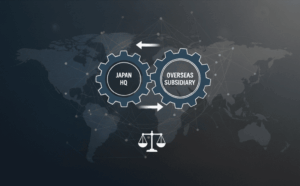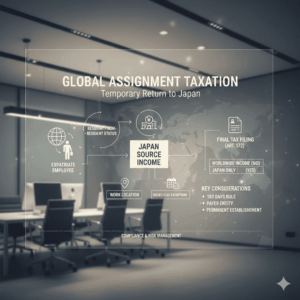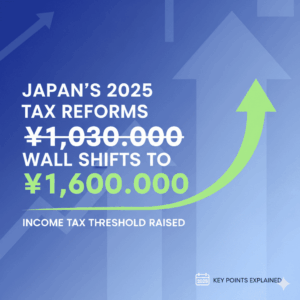Four Categories of Taxpayers and Their Taxation Scope
Japan’s tax system divides taxpayers into four categories, each with different taxation scopes.
Residents are individuals who have an address in Japan or have continuously maintained a place of residence in Japan for one year or more up to the present. Residents are generally subject to taxation in Japan on all income, both domestic and foreign.
Among residents, there is a special category called “Non-permanent Residents“. These are individuals who do not hold Japanese nationality and have had an address or place of residence in Japan for 5 years or less within the past 10 years. Their taxation scope is more limited than general residents.
Non-residents are individuals who have neither an address nor a place of residence in Japan for one year or more. This includes foreigners temporarily staying in Japan and Japanese nationals who have moved overseas. Non-residents are generally subject to Japanese taxation only on domestic source income.
Domestic corporations are corporations that have their head office or principal place of business in Japan. Typical examples include stock companies and limited liability companies established in Japan. Domestic corporations are generally subject to taxation in Japan on all income, both domestic and foreign.
Foreign corporations are corporations that have neither their head office nor principal place of business in Japan. This includes cases where companies established abroad conduct business activities in Japan. Foreign corporations are generally subject to Japanese taxation only on domestic source income.
Taxation Limitation Mechanism Based on Domestic Source Income
Domestic source income refers to income whose source is located within Japan. Examples include rental income from real estate located in Japan, dividends from Japanese companies, and compensation for services provided within Japan.
Why is taxation limited to domestic source income? This is because the basis for exercising taxation rights over non-residents and foreign corporations emphasizes “the fact that the income is generated within Japan“. This is a generally accepted international approach based on the “source principle,” which holds that the country where income is generated has taxation rights.
The differences in taxation scope can be summarized as follows: Worldwide income taxation (all domestic and foreign income) applies to residents and domestic corporations, while only domestic source income taxation applies to non-residents and foreign corporations.
Through this classification, Japan draws a clear line by comprehensively taxing its own residents and domestic corporations while limiting taxation on foreign residents and corporations.
Definition of “Domestic Source Income” for Foreign Corporations (Excerpts from Article 138 of the Corporation Tax Act, with modifications)
Item 1: Business Income Through Permanent Establishment
This provision covers income when a foreign corporation establishes a permanent establishment (PE) in Japan and conducts business.
【Key Points】
Assumes the permanent establishment is an independent business entity from the foreign corporation
Income is calculated by comprehensively considering the following elements:
Functions performed by the permanent establishment
Assets used at the permanent establishment
Internal transactions between the permanent establishment and head office
Other circumstances
Income generated from the transfer of the permanent establishment is also included
【Definition of Head Office, etc.】 Refers to the foreign corporation’s head office, branches, factories, and other similar entities, excluding permanent establishments.
Item 2: Income from Operation and Holding of Domestic Assets(Also subject to taxation for foreign corporations without permanent establishments)
Income generated from the operation or holding of assets located in Japan is covered, excluding those that fall under Items 8 through 11 and Items 13 through 16 of Article 161, Paragraph 1 of the Income Tax Act.
【Examples of Excluded Income】
Dividends
Interest
Royalties
Salaries
Item 3: Income from Transfer of Domestic Assets(Also subject to taxation for foreign corporations without permanent establishments)
Income generated from the transfer of assets located in Japan as defined by government ordinance.
Item 4: Compensation for Personal Service Business(Also subject to taxation for foreign corporations without permanent establishments)
Compensation received by corporations conducting business primarily involving the provision of personal services within Japan. The applicable businesses are defined by government ordinance.
Item 5: Compensation for Real Estate Leasing(Also subject to taxation for foreign corporations without permanent establishments)
Compensation from the following types of leasing:
Real Estate Related
Leasing of real estate located in Japan
Leasing of rights existing on real estate located in Japan
Leasing of quarrying rights
Establishment of surface rights
Any other acts of allowing the use of real estate
Mining Rights Related
Establishment of mining leases
Ships and Aircraft Related
Leasing of ships or aircraft to Japanese residents or domestic corporations
Item 6: Other Domestic Source Income(Also subject to taxation for corporations without permanent establishments)
In addition to the preceding items, income whose source is domestic as defined by government ordinance.
Paragraph 2: Definition of Internal Transactions
This paragraph provides a detailed definition of “internal transactions” mentioned in Item 1 of Paragraph 1.
Internal transactions refer to the following facts between a foreign corporation’s permanent establishment and its head office: transfer of assets, provision of services, and other facts
【Criteria for Determination】 Cases where, if similar facts occurred between independent business entities, the following transactions would be recognized: sale of assets, purchase of assets, provision of services, and other transactions
【Excluded Transactions】
Guarantees of debt related to borrowing funds
Reinsurance undertaking for insurance liability related to insurance contracts
Other similar transactions as defined by government ordinance

Tax Base for Foreign Corporation Tax (Excerpts from Article 141 of the Corporation Tax Act, with modifications)
This article defines the tax base (the amount that forms the basis for tax calculation) for corporation tax imposed on foreign corporations for each business year. Foreign corporations are classified into two categories based on “whether they have a permanent establishment,” with different taxation methods applied to each.
Item 1: Foreign Corporations with Permanent Establishments
【Target】 Foreign corporations that have established a permanent establishment (PE) in Japan
【Domestic Source Income as Tax Base】 This is divided into two categories:
(a) Domestic source income under Article 138, Paragraph 1, Item 1
【Content】 Income generated through conducting business through a permanent establishment
【Specific Examples】
Profits from business activities conducted by Japanese branches
Investment income from assets attributable to the permanent establishment
Income from internal transactions between the permanent establishment and head office
Income generated from the transfer of the permanent establishment itself
(b) Domestic source income under Article 138, Paragraph 1, Items 2 through 6
【Content】 Domestic source income from activities other than the permanent establishment (excluding those falling under (a))
【Specific Examples】
Rental income from Japanese real estate held by entities other than the permanent establishment
Capital gains from transfer of domestic assets by entities other than the permanent establishment
Compensation for personal services provided in Japan by entities other than the permanent establishment
Other domestic source income
Item 2: Foreign Corporations without Permanent Establishments
【Target】 Foreign corporations that have not established a permanent establishment in Japan
【Domestic Source Income as Tax Base】 Domestic source income listed in Article 138, Paragraph 1, Items 2 through 6
【Specific Examples】
Rental income from real estate in Japan
Capital gains from transfer of domestic assets
Compensation for personal services provided in Japan
Compensation for leasing ships and aircraft to Japanese residents and domestic corporations
Other domestic source income as defined by government ordinance
【Note】 Since there is no permanent establishment, Article 138, Paragraph 1, Item 1 (permanent establishment income) is excluded.
Differences in Taxation Methods
Foreign corporations with permanent establishments are subject to comprehensive taxation: Comprehensive taxation is applied through permanent establishment income + other domestic source income
Foreign corporations without permanent establishments are subject to limited taxation: Limited taxation corresponding to limited relationships with Japan through specific domestic source income only.
Appropriate taxation scope is established according to the degree of business activities of foreign corporations in Japan:
Classification based on presence of permanent establishment: Reflects the substantial degree of business activities in Japan
Prevention of double counting of income: Appropriate classification of permanent establishment income and other domestic source income
Consistency with international taxation principles: Harmonization with international standards such as the OECD Model Tax Convention
Through these provisions, foreign corporations bear fair and appropriate tax burdens according to their form of business development in Japan.
Correspondence of Taxation Methods and Practical Treatment
Taxation methods for domestic source income of non-residents and foreign corporations are broadly divided into two patterns.
The first is the self-assessment taxation method. This is a method where income is combined with other income for comprehensive taxation, requiring taxpayers to file their own tax returns.
The second is the withholding separate taxation method. This is a method where taxes are withheld at the time of income payment, completing the tax relationship.
Which taxation method applies depends mainly on the presence or absence of a permanent establishment (PE) and whether domestic source income is attributable to that PE. When there is a permanent establishment and income is attributable to the PE, self-assessment taxation generally applies. When there is no permanent establishment or income is not attributable to the PE, withholding separate taxation generally applies.
In practice, for withholding separate taxation, the payer (such as a Japanese company) withholds income tax at a certain rate when paying income, and the tax relationship ends there. For self-assessment taxation, non-residents and foreign corporations must file their own tax returns.
Summary
For non-residents and foreign corporations, taxation scope is limited to domestic source income, and appropriate taxation methods are selected based on the presence or absence of permanent establishments, thereby avoiding excessive taxation while ensuring appropriate tax revenue. Foreign corporations considering entry into Japan should understand these basic mechanisms.










